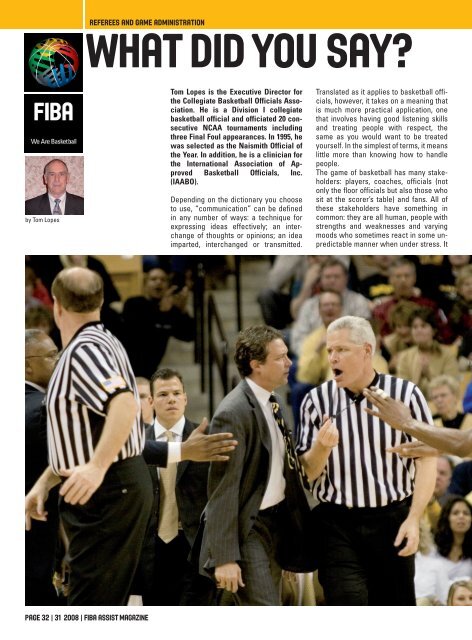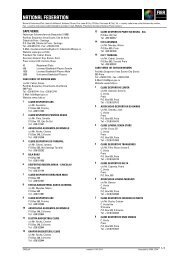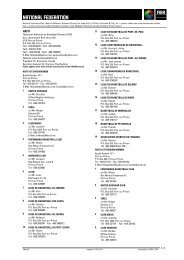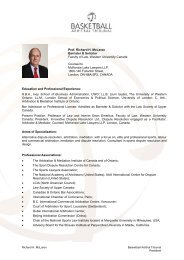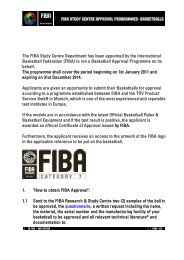Referees and Game Administration - Fiba
Referees and Game Administration - Fiba
Referees and Game Administration - Fiba
Create successful ePaper yourself
Turn your PDF publications into a flip-book with our unique Google optimized e-Paper software.
y Tom Lopes<br />
referees <strong>and</strong> game administration<br />
WHAT DID YOU SAY?<br />
page 32 | 31 2008 | <strong>Fiba</strong> Assist Magazine<br />
Tom Lopes is the Executive Director for<br />
the Collegiate Basketball Officials Association.<br />
He is a Division I collegiate<br />
basketball official <strong>and</strong> officiated 20 consecutive<br />
NCAA tournaments including<br />
three Final Foul appearances. In 1995, he<br />
was selected as the Naismith Official of<br />
the Year. In addition, he is a clinician for<br />
the International Association of Approved<br />
Basketball Officials, Inc.<br />
(IAABO).<br />
Depending on the dictionary you choose<br />
to use, “communication” can be defined<br />
in any number of ways: a technique for<br />
expressing ideas effectively; an interchange<br />
of thoughts or opinions; an idea<br />
imparted, interchanged or transmitted.<br />
Translated as it applies to basketball officials,<br />
however, it takes on a meaning that<br />
is much more practical application, one<br />
that involves having good listening skills<br />
<strong>and</strong> treating people with respect, the<br />
same as you would want to be treated<br />
yourself. In the simplest of terms, it means<br />
little more than knowing how to h<strong>and</strong>le<br />
people.<br />
The game of basketball has many stakeholders:<br />
players, coaches, officials (not<br />
only the floor officials but also those who<br />
sit at the scorer’s table) <strong>and</strong> fans. All of<br />
these stakeholders have something in<br />
common: they are all human, people with<br />
strengths <strong>and</strong> weaknesses <strong>and</strong> varying<br />
moods who sometimes react in some unpredictable<br />
manner when under stress. It
is in these moments of stress that the better<br />
officials st<strong>and</strong> out from their less<br />
effective counterparts.<br />
A basic fact in the human condition is that<br />
the most common set of the reasons for<br />
why someone loses emotional control,<br />
whether in sport or otherwise, is twofold:<br />
first, that person is of the opinion that he<br />
or she has been somehow treated unjustly;<br />
second, he or she wants to express an<br />
objection, in words or actions, to that perceived<br />
wrong. Essentially, the person is<br />
saying “what you did was unfair <strong>and</strong> I<br />
want you to know how I feel about it.”<br />
This reality applies as much to basketball<br />
officiating as it does to any perception of<br />
having been wronged. When such a situation<br />
arises <strong>and</strong> an official’s decision is<br />
challenged, the easiest way out might be<br />
for the official to penalize the challenge<br />
immediately by assessing a technical foul,<br />
a technical foul that could very well have<br />
been avoided by using effective communication<br />
skills <strong>and</strong> recognizing that what<br />
could be taken as a blatant <strong>and</strong> very personal<br />
insult was really no more than an<br />
objection, misguided or otherwise, to a<br />
perceived injustice.<br />
This is where communication enters the<br />
picture. In officiating, a brief moment’s<br />
well-placed <strong>and</strong> effective interaction often<br />
makes the difference. Such skill<br />
distinguishes the mediocre, “every day”<br />
variety referee, the one who is usually<br />
assigned to less challenging contests,<br />
from his or her fellow official who by contrast<br />
seems to draw all the important<br />
games. Arguably, they both could be at<br />
the same level of knowledge when it<br />
comes to rules <strong>and</strong> floor mechanics, but<br />
the official who is in dem<strong>and</strong> is the one<br />
who demonstrates an ability to interact<br />
effectively with players, coaches <strong>and</strong><br />
even with his or her partners on the officiating<br />
team. It has been said that<br />
experience is the best teacher <strong>and</strong> this<br />
certainly applies to officiating. As young<br />
<strong>and</strong> inexperienced referees we all made<br />
the common mistake of saying the wrong<br />
thing at the wrong time. There are few of<br />
us who can’t remember that occasion in<br />
our early years when we said to a coach,<br />
“you coach <strong>and</strong> I’ll referee.” In most cases,<br />
such a comment only opened the door<br />
for a response from the coach, like “when<br />
are you going to start?” The rule of thumb<br />
that says “for every action there is a reaction”<br />
is as true to human relations as it<br />
is to physics! Other examples of verbal<br />
inexperience are such challenging comments<br />
as “sit down”, “stop refereeing”,<br />
“get back into the team bench area” <strong>and</strong>,<br />
the worst of all, “shut up.”<br />
All of these declarations immediately put<br />
up a barrier to further communication;<br />
you <strong>and</strong> the object of your comment are<br />
now in an adversarial role <strong>and</strong> potentially<br />
in line for a long <strong>and</strong> difficult game. Body<br />
language is another form of communication.<br />
Staring at someone, putting h<strong>and</strong>s<br />
on hips, pointing a finger: all of these<br />
present a direct challenge <strong>and</strong> will normally<br />
generate a negative response from<br />
the coach or player.<br />
In the early years of learning their craft,<br />
officials will experience all of the above<br />
<strong>and</strong> hopefully will make adjustments as<br />
they review what happened in individual<br />
games. Such reviews are quite natural;<br />
how often, as we were driving home,<br />
have we found ourselves second-guessing<br />
how we h<strong>and</strong>led a disenchanted<br />
player or an angry coach, or how we<br />
might have answered a challenge differently<br />
so as to diffuse rather than escalate<br />
the problem.<br />
Even the most inexperienced official<br />
knows he or she has the authority to levy<br />
a technical foul if the defiance merits it.<br />
The spirit <strong>and</strong> intent of the technical foul<br />
rule, however, is that such a penalty<br />
should be used only as a last resort, with<br />
the ultimate purpose of restoring the order<br />
that is necessary if there is to be fair<br />
play.<br />
The problem for less experienced officials,<br />
therefore, is recognizing the<br />
difference between a behaviour that requires<br />
a technical foul <strong>and</strong> a behaviour<br />
that can be more smoothly diffused with a<br />
serving of patience seasoned with effective<br />
communication <strong>and</strong> a touch of<br />
compassion.<br />
How do the good officials h<strong>and</strong>le situations?<br />
The best way to find the answer to<br />
this question is simply to ask them. In your<br />
area there are probably some very good<br />
<strong>and</strong> successful officials. Talk to them; observe<br />
them in action; ask them what it<br />
was that he or she said to that frustrated<br />
coach or player in the final two minutes of<br />
the game that put the coach at ease <strong>and</strong><br />
prevented a disruption from escalating.<br />
Officials have to anticipate criticism from<br />
coaches <strong>and</strong> players during the game <strong>and</strong><br />
must not take such comments personally.<br />
There are many techniques at our disposal<br />
when such situations develop. Try<br />
immediately moving quickly to your assigned<br />
position on the court after<br />
reporting a foul; if the coach has a question,<br />
he or she will get your attention<br />
without your having to wait around. When<br />
it does become prudent to reply to such a<br />
challenge, always remember to be a responder<br />
rather than an initiator. Don’t<br />
bother to answer statements (they don’t<br />
usually require an answer anyway) but if<br />
the coach does have a question you<br />
should let him or her ask it before you<br />
start talking. Always be under control;<br />
speak in calm, easy tones, be aware of<br />
body language <strong>and</strong> try to maintain an<br />
alert, positive <strong>and</strong> confident posture.<br />
When talking to a coach, make it so no<br />
one else can hear what you are saying.<br />
When you are questioned on a call, try to<br />
keep your answer simple <strong>and</strong> to the point.<br />
Some possibilities are “I missed the call”,<br />
or “From my angle I’m sure I was correct”,<br />
or “I think I was correct <strong>and</strong> you<br />
think you’re correct, but we’ll both have<br />
to see the tape to know for sure.” Don’t<br />
try to bluff; it just doesn’t work.<br />
Remember also that if a question has<br />
been asked or a clarification requested,<br />
don’t ignore the coach or player. Many<br />
times a short, honest answer or explanation<br />
will do wonders for your credibility.<br />
And when all else fails <strong>and</strong> the coach or<br />
player is clearly out of control, it’s time to<br />
stop talking <strong>and</strong> blow the whistle.<br />
<strong>Fiba</strong> Assist Magazine | 31 2008 | Page 33


